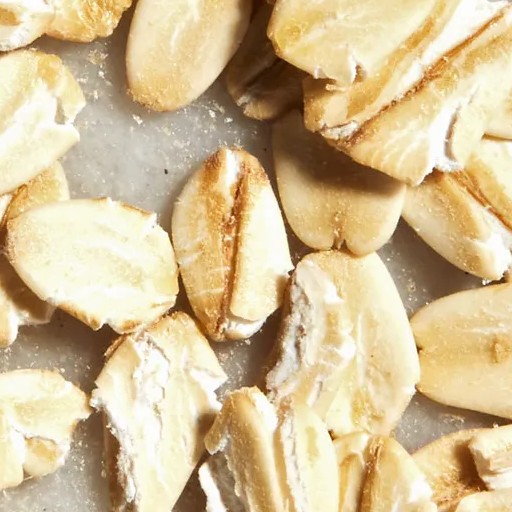Oat

Oat
The oat, sometimes called the common oat, is a species of cereal grain grown for its seed, which is known by the same name. While oats are suitable for human consumption as oatmeal and rolled oats, one of the most common uses is as livestock feed. (Wikipedia)
Rolled oats are a type of lightly processed whole-grain food. Traditionally, they are made from oat groats that have been dehusked and steamed, before being rolled into flat flakes under heavy rollers and then stabilized by being lightly toasted. (Wikipedia)
Oatmeal refers to a preparation of oats that have been dehusked, steamed and flattened, or else a coarse flour made of hulled oat grains that have either been milled or steel-cut. Ground oats are also called "white oats". Steel-cut oats are known as "coarse oatmeal", "Irish oatmeal" or "pinhead oats". (Wikipedia)
Quick Oats are oats that have been steamed and rolled extremely thin. As a result, the oats have a tendency to break apart slightly and give the appearance of being coarsely chopped. The small pieces reduce the overall surface area and speeds up cooking time. They have the exact same flavour as regular rolled oats, however, the texture and consistency of the finished products defers slightly. (simplyoatmeal.com)
Nutritional Benefit of Oats:
According to article by Ms.Adda Bjarnadottir (MS.RDN(Ice) on 17th May 2019, published on “Healthline”, Oats,
1. Can lower cholesterol. Studies have repeatedly confirmed that oats can lower cholesterol levels, which may reduce your risk of heart disease.
2. May prevent type 2 diabetes. In people with type 2 diabetes and severe insulin resistance, a 4-week dietary intervention with oatmeal resulted in a 40% reduction in the insulin dosage needed for stabilizing blood sugar levels.
3. May boost fullness. Fullness plays an important role in energy balance, as it stops you from eating until hunger returns. Human studies reveal that oatmeal may boost fullness and reduce appetite more than ready-to-eat breakfast cereals and other types of dietary fibre. Plus, oats are low in calories and high in fibre and other healthy nutrients, making them an excellent addition to an effective weight loss diet.
4. Enhance the nutritional value of gluten-free diet. Oats are not glutenous but contain a similar type of protein called avenin. Oats have been shown to enhance the nutritional value of gluten-free diets, increasing both mineral and fibre intakes.
5. Decrease childhood asthma. Feeding oats to young infants under six months of age is associated with a decreased risk of childhood asthma.
6. May boost your immune system. A few studies indicate that oats may boost your immune system, enhancing your ability to fight bacteria, viruses, fungi, and parasites.
7. May improve overall well-being. In older adults, eating oat bran fiber may improve overall well-being and decrease the need for laxatives.

